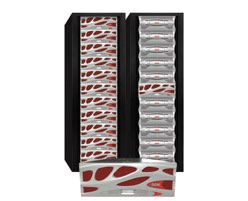 Today DDN announced that the National Center for Atmospheric Research (NCAR) has selected DDN’s new SFA14K high-performance hyper-converged storage platform to drive the performance and deliver the capacity needed for scientific breakthroughs in climate, weather and atmospheric-related science to power its Cheyenne supercomputer. Sponsored by the National Science Foundation, NCAR brings together researchers from more than 100 North American colleges and universities along with thousands of scientists from the global scientific community to identify the risks and opportunities associated with changes in the Earth’s atmosphere.
Today DDN announced that the National Center for Atmospheric Research (NCAR) has selected DDN’s new SFA14K high-performance hyper-converged storage platform to drive the performance and deliver the capacity needed for scientific breakthroughs in climate, weather and atmospheric-related science to power its Cheyenne supercomputer. Sponsored by the National Science Foundation, NCAR brings together researchers from more than 100 North American colleges and universities along with thousands of scientists from the global scientific community to identify the risks and opportunities associated with changes in the Earth’s atmosphere.
Whether it’s protecting aircraft from wind shear, investigating changes in the earth’s ozone layer, determining sunspot behavior or linking weather to factors that shape epidemics, NCAR is on the forefront of major climate and weather research. Simulations from the organization’s most advanced models are used to study past, present and future changes in weather patterns in richer detail and with greater accuracy. With each simulation generating hundreds of terabytes of output, data management challenges scale up rapidly.
With the game-changing SFA14K, NCAR now has the storage capacity and sustained compute performance to perform sophisticated modeling while substantially reducing workflow bottlenecks. As a result, the organization will be able to quickly process mixed I/O workloads while sharing up to 40 PBs of vital research data with a growing scientific community around the world.
“Having a centralized, large-scale storage resource delivers a real benefit to our scientists,” said Anke Kamrath, director of the operations and services division at NCAR’s computing lab. “With the new system, we have a balance between capacity and performance so that researchers will be able to start looking at the model output immediately without having to move data around. Now, they’ll be able to get right down to the work of analyzing the results and figuring out what the models reveal.”
NCAR plans to take advantage of DDN’s storage leadership and experience gained from broad global deployments in weather and climate modeling to support data-intensive research efforts such as the Coupled Model Intercomparison Project phase 6 (CMIP6). CMIP6 is a multi-model experiment framework and involves the execution and analysis of high-resolution, interlocked climate models and global experiments. As such, NCAR will rely on DDN to support both large block I/O and lots of small I/O requirements. Additionally, the organization will leverage DDN’s proven ability with HPC workflows and long-standing successful technology partnership with SGI to optimize traditional climate codes, including the Weather Research and Forecasting Model (WRF) and Community Earth System Model (CESM).
With its latest storage advancements, DDN also will strengthen NCAR’s ability to support a variety of extremely large ensemble research studies that will likely each generate petabytes of crucial research data. For example, scientists performing hydrology experiments encompassing snowmelt and watershed projects previously could model a single river basin with precision. Moving forward, they will be able to create highly detailed models of entire river systems that cross multiple states and basins to provide much greater levels of insight that can be accessed and shared globally.
The new system will enable us to keep pace with the increased number of people trying to do very large data assimilation problems,” added Rich Loft, director of technology development in the computational and information systems laboratory at NCAR. “Earth system research is very data intensive. NCAR will now be able to do more to help scientists go beyond just studying phenomena to actually making predictions through data-intensive simulations that require larger I/O bandwidth and storage performance.”
Download the insideHPC Guide to Guide to Weather Forecasting and Climate Research



